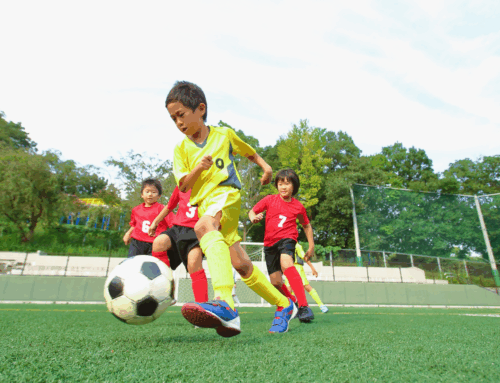Get our exclusive report. Download the iSport360 Club Switching Report Here – For Club Admins, Rec Leaders and Coaches.
Do you know how to help your athlete after a bad game?
If your athlete has a bad competition, game, or practice, it can lead to a tense car ride home. Often, caregivers are well-meaning in their efforts to soothe grumpy athletes with advice and reassurances. Unfortunately, we often end up creating a more stressful, angst-filled situation in our attempts to help our athletes.
Here, TrueSport Expert Kevin Chapman, PhD, clinical psychologist and founder of The Kentucky Center for Anxiety and Related Disorders, shares a few simple strategies to help your athlete move on from a bad performance in a way that’s productive.
Start: Create a post-game routine
Creating a routine and ritual for after any game or practice can be a helpful way of smoothing over these difficult moments, says Chapman. You can start by setting rules like, “athletes are allowed to sulk for the duration of two songs on their playlist,” or “no complaining about the coach or your teammates,” or “no phones in the van on the drive home.” You can even have your athlete create a post-game playlist that they’d prefer to listen to. Finally, make sure there are spare snacks and water in the car after games: A hungry athlete is much more likely to be emotional.
Stop: Saying “You’ll be fine.”
As adults, it’s easy to see that one bad game will not ruin an athlete’s life—but try to remember how you felt as a teenager when something went wrong. “I think the tendency for most caregivers is that we naturally want to soothe our athletes right away,” Chapman says. “We say things like, ‘It’s okay,’ or ‘You’ll be fine.’ But even though that’s well-intentioned, it’s never effective because it ignores your athlete’s feelings. And often, your athlete feels invalidated and therefore resentful of you.”
Start: Normalizing emotions
“The number one thing a parent can do is normalize the intense emotions that their athlete is feeling,” says Chapman. “Try to get your athlete to move through their feelings so that they can really begin to decompress and then make rational assessments.”
‘Moving through feelings’ doesn’t mean allowing your athlete to throw a temper tantrum or direct their anger at you in the car during the drive home. It’s good for them to vent or cry, but they aren’t allowed to act disrespectfully towards you, their friends, siblings, or anyone on their team.
Stop: Forcing your athlete to talk
Often, caregivers try to force their athlete to open up about how they’re feeling with the best of intentions. However, sometimes, the athlete simply needs a few moments of silence, says Chapman.
“You can tell your athlete that you’re available to talk when they’re ready, but try not to push them,” he says. “Pushing your athlete to talk to you can trigger them even more and make them feel worse. Parents need to allow athletes to be autonomous. Prying and pushing is going to make the athlete even less likely to want to share their feelings.”
Start: Asking the right questions
If your athlete is willing to talk, don’t offer advice right away. Instead, ask thoughtful questions, and actually listen to your athlete. “Parents can help their athletes move towards asking themselves what they learned from competition, rather than what went wrong,” says Chapman. “Try asking, ‘What did you learn?’ And then your athlete can come up with two or three bullet points about things they did well or not well.”
Start: Separating your athlete’s identity from their performance
The best way to help your athlete come to terms with a bad performance is to help them separate their identities from their outcomes. “It’s important for athletes to understand that their performance is not the same thing as their identity,” Chapman says.
“Help your athlete develop a learning mentality, where they’re able to take information and lessons from bad games without seeing it as a reflection on their self-worth,” he adds. You can ask questions like, “What’s the evidence that this performance means you aren’t any good?” and “What’s another explanation for your performance?”
Stop: Complaining about the coach/teammate/referee/other team
Parents can do more harm than good when they try to sympathize with their athletes by complaining about a call that the umpire made, a play that the coach suggested, or the way a teammate passed the ball.
“Parents need to be very conscientious about what they say to their kids,” says Chapman. “Complaining about the coach, for example, models a negative interaction for the athlete and puts them in an adversarial position with their coach. Even if you disagree with something that a coach may have done, don’t bring it up.”
Start: Reminding your athlete of the consequences
Unfortunately, athletes now have immediate access to their friends and social media via their smartphones, and in the heat of the moment after a bad game, it’s easy to send a post that bashes the coach or a teammate without thinking. If your athlete is sitting in the car frantically typing on their phone, you can suggest that they take a pause, or create an overarching rule that there are no phones in the car post-game, whether it goes well or not.
“Start by saying, ‘I know that you’re having intense emotions, but I would be very conscious of how you respond to them. I would take a break from anything, including your phone, and I would highly encourage you just to allow yourself to think,” says Chapman. “At a minimum, remind your athlete that impulsive posting could have consequences.”
Stop: Equating losing with no reward
A big win or a great game should have a special reward, like picking up takeout at a favorite restaurant on the way home. But every competition should have some kind of ritual attached, regardless of how it goes.
“I am a fan of reinforcing great performances in special ways, but I do think that there needs to be a consistent after-competition ritual regardless of the outcome,” says Chapman. “Small rewards like stopping for a milkshake on the way home should be tied to solid effort during the competition, not if they scored a certain number of points.”
Takeaway
Create rituals and routines for after competitions that remain the same regardless of the outcome in order to help your athlete have a sense of structure. After a bad game or competition, let your athlete feel their emotions, whether they’re complaining, venting, crying, or just need a few minutes of silence. Ask questions to help them think about what they learned rather than what went wrong. And remember, your athlete will reflect your behavior, so be mindful of how you talk about coaches, umpires, and other players.
About TrueSport
TrueSport®, a movement powered by the experience and values of the U.S. Anti-Doping Agency, champions the positive values and life lessons learned through youth sport. Backed by U.S. Congressional mandate, TrueSport inspires athletes, coaches, parents, and administrators to change the culture of youth sport through active engagement and thoughtful curriculum based on cornerstone lessons of sportsmanship, character-building, and clean and healthy performance, while also creating leaders across communities through sport.
For more expert-driven articles and materials, visit TrueSport’s comprehensive collection of resources.
This content was reproduced in partnership with TrueSport. Any content copied or reproduced without TrueSport and the U.S. Anti-Doping Agency’s express written permission would be in violation of our copyright, and subject to legal recourse. To learn more or request permission to reproduce content, click here.
You can link back to the TrueSport article beginning May 1, 2024 at:
https://truesport.org/mental-wellness/help-athlete-after-a-bad-game/
About iSport360
iSport360 is the only app that does it all for youth sports. For more information on what we do, click here.
Learn more or request a demo of our youth sports software that is helping teams improve communication, organization and player development.
March 17, 2025





